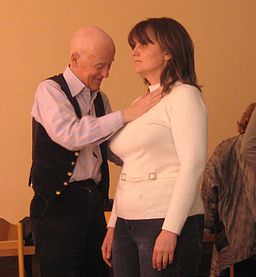 |
| Radosław Drożdżewski (Zwiadowca21) [CC BY-SA 4.0] |
When religious believers ask atheists why we insist that religious belief can be harmful, there are so many valid answers that it can be difficult to know where to start. One of the more common categories of reasons includes the perils of indulging in false comforts, leading one to abandon the sort of real-world action that might resolve a problem in exchange for superstitious rituals that accomplish little (e.g., prayer).
One of the more concerning areas where we see this sort of thing is in the arena of health care. Imagine the person who learns he has high blood pressure and desperately needs to make dietary changes and increase his level of exercise. Suppose he decides to ignore his doctor's advice and rely instead on prayer. We atheists are inclined to see this as problematic.
Of course, there is also the far more powerful example of the parents who deny medical care to their child and resort to prayer instead. When the child dies, we cannot simply say that the religious person got what he or she deserved; a child is dead because of superstition.
The BBC News Magazine recently posted about people who believe in medical miracles (i.e., faith healing). Not surprisingly, most of those mentioned were evangelical Christians. In reading the article, the things that will inevitably jump out at you are the lack of evidence to support the fantastic claims of faith healing and how little this lack of evidence matters to believers.
These claims are, by any standards, implausible. But in the world of Pentecostal healing, no-one worries about that. In fact, the more impossible the miracle (and they use the term without embarrassment) the better, because it's more effective for spreading their message.
Right. Implausible claims are actually a good thing in this context. After all, we're talking about miracles here. Miracles are supposed to be implausible. And what could be less plausible than raising people from the dead?
The article briefly mentions Tyler Johnson and his Dead Raising Team. Evidently, they claim to have brought "several" people back to life and will soon be the subjects of a new documentary film (i.e., Deadraisers). For more about Johnson and his team, see this post by Beth Erickson (Incongruent Elements).
The best part of the BBC post was how they described Deadraisers.
Johnson appears in a new documentary film called Deadraisers, which follows enthusiasts as they trail round hospitals and mortuaries trying to bring people back to life. Sadly, those they pray for in the film remain resolutely dead.
I'll admit that I laughed out loud when I read that last sentence. Still, Erickson's post reminds us that this really isn't a laughing matter. The idea that these charlatans would prey on those grieving the loss of a loved one with this sort of nonsense is unsettling to say the least.